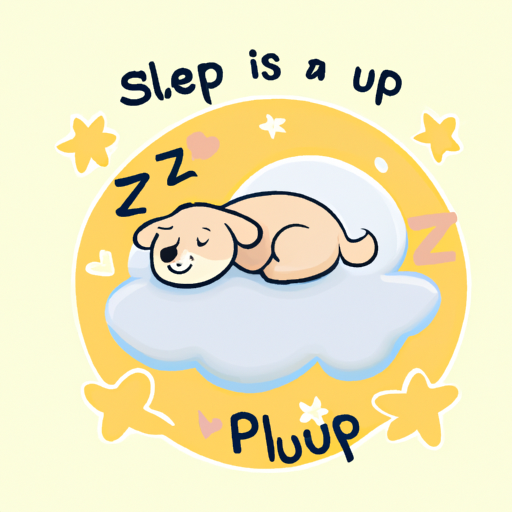Introduction
You’ve got a new puppy, and you’re thrilled. You’re ready to play, cuddle, and start teaching your new best friend some tricks. But there’s a problem: your puppy sleeps all day.
Before you rush to the vet in a panic, stop and take a breath. It’s perfectly normal for puppies to sleep a lot. In fact, it’s essential for their growth and development. But let’s delve into the details.
Puppy Sleep Basics
Firstly, it’s normal for puppies to sleep a lot. Puppies can sleep anywhere from 18 to 20 hours a day, especially during their first few months.
Why do they sleep so much? Their bodies are growing rapidly, and sleep is a crucial part of this process. During sleep, puppies’ bodies produce a growth hormone. This hormone is only produced during sleep, which is why it’s so important for them to get plenty of rest.
Factors That Influence Puppy Sleep
Several factors can influence how much your puppy sleeps, including:
- Age: Younger puppies sleep more than older ones.
- Breed: Some breeds are more active than others.
- Health: If your puppy is ill, they might sleep more than usual.
- Activity: The more active the puppy, the more sleep they’ll need.
| Age | Breed | Health | Activity |
|---|---|---|---|
| Younger puppies need more sleep | Some breeds are naturally more active | Illness can increase sleep | Active puppies need more sleep |
Signs Your Puppy Might Be Sleeping Too Much
While it’s normal for puppies to sleep a lot, there can be signs that they’re sleeping too much. These include:
- Lack of interest in food or play
- Lethargy or fatigue when awake
- Constant sleep, even with plenty of stimulation
If you notice these signs, it’s a good idea to consult with a veterinarian.
How to Establish a Healthy Sleep Routine
A healthy sleep routine is essential for your puppy’s development. Here are some steps you can take:
-
Establish a bedtime routine: Just like humans, puppies benefit from a regular sleep routine. This could include a bedtime story, a cuddle session, or a nighttime walk.
-
Provide a comfortable sleep environment: Make sure your puppy has a comfortable, quiet place to sleep. This could be a crate, a dog bed, or a designated area in your house.
-
Encourage daytime activity: Make sure your puppy has plenty of opportunities to play and be active during the day. This will help them sleep better at night.
Coping with Nighttime Wakefulness
Puppies, like human babies, may have nighttime wakefulness. Here are some tips to help you cope:
- Have a set bedtime and stick to it.
- Limit water intake before bed.
- Use a nightlight or soft music to soothe your puppy.
FAQ
Why is my puppy sleeping all day?
Puppies sleep a lot, especially during their first few months. This is because their bodies are growing rapidly, and sleep is essential for this process.
Should I wake my puppy up to play or eat?
It’s best to let sleeping puppies lie. If your puppy is sleeping, it’s because their body needs it. However, if it’s time for a meal and your puppy is still sleeping, you can wake them up gently.
Is it normal for my puppy to sleep after eating?
Yes, it’s normal. Just as humans often feel sleepy after a big meal, puppies may also need a nap after eating.
How can I help my puppy sleep through the night?
Establish a regular bedtime routine, provide a comfortable sleep environment, and encourage daytime activity.
What if my puppy is sleeping more than usual?
If your puppy is sleeping more than usual, and showing signs of lethargy or lack of interest in food or play, it’s a good idea to consult with a veterinarian.
Conclusion
In conclusion, it’s completely normal for your puppy to sleep a lot. Remember, your little furry friend is growing and developing, and sleep is an essential part of this process. So, let them sleep, and enjoy the peace and quiet while you can!



